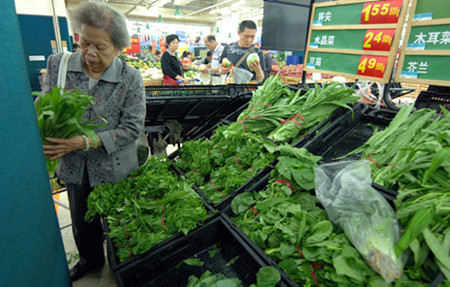Green China
Government extends food-tracking project
Updated: 2011-07-30 09:36
By Li Jiabao (China Daily)
|
 |
|
A customer chooses vegetables at a supermarket in Guiyang, Guizhou province. A series of food safety scandals in recent years has greatly heightened public concern about food safety. [Photo/for China Daily] |
MOFCOM instigated the second phase of pilot scheme on Friday
BEIJING - The Ministry of Commerce has expanded a pilot meat and vegetable tracking system to 10 more cities on Friday, aiming to improve food safety.
Officials from the ministry signed cooperative agreements with senior government officials from 10 cities including Harbin, Jinan and Urumqi on Friday, to start the second phase of a pilot project for a meat and vegetable tracking system.
The ministry started the first-phase pilot of the system in October 2010 in 10 cities, including Shanghai and Dalian. The system will allow consumers to check the provenance of meat and vegetables by the use of bar codes on the products once the system is in place.
The system will standardize the transportation of meat and vegetables, two key agricultural products, and will lead to changes in the current system to provide a higher standard of food safety.
"The tracking system will boost the development of modern transportation of agricultural produce with electronic commerce. Transportation is an important factor in the price fluctuations of agricultural products," Jiang Zengwei, vice-minister of commerce, said at a news conference on Friday.
"By the end of the year, the tracking system piloted in the first 10 cities will be put into full use. By the end of the 12th Five-year Plan (2011-2015), the tracking system should cover the transportation of meat and vegetables across the country and will be expanded to other areas such as fruit and marine products on a step-by-step basis," Jiang said.
Approximately 80 percent of meat and vegetables in the larger cities are produced in rural areas, while more than 80 percent of the transportation is done through wholesale markets. The first-phase of the system now covers 176 slaughterhouses, 100 large wholesale markets, more than 3,000 food markets, 1,400 supermarkets and more than 4,400 bulk buyers in the 10 pilot cities.
A series of food safety scandals in recent years, including contaminated milk and pork from pigs fed with illegal additives, has greatly heightened public concern about food safety. The tracking system is part of the government's efforts to improve the situation.
Huang Guiheng, a manager at Bric Global Agricultural Consultants Ltd, said that the tracking system is in the interests of consumers, who will be able to check the source of the produce.
"Consumers will choose meat or vegetables verified by the tracking system, providing the cost of the system does not add much to the price," he said.
However, he said the greater significance of the tracking system lies in establishing food safety standards by involving leading enterprises in the system. "The tracking system should start with leading enterprises to set safety standards and then be extended to the entire food industry. Businesses will welcome the tracking system which will promote their brands," he said.

Specials

Carrier set for maiden voyage
China is refitting an obsolete aircraft carrier bought from Ukraine for research and training purposes.
 Photo
Photo  Video
Video

Pulling heart strings
The 5,000-year-old guqin holds a special place for both european and Chinese music lovers

Fit to a tea
Sixth-generation member of tea family brews up new ideas to modernize a time-honored business